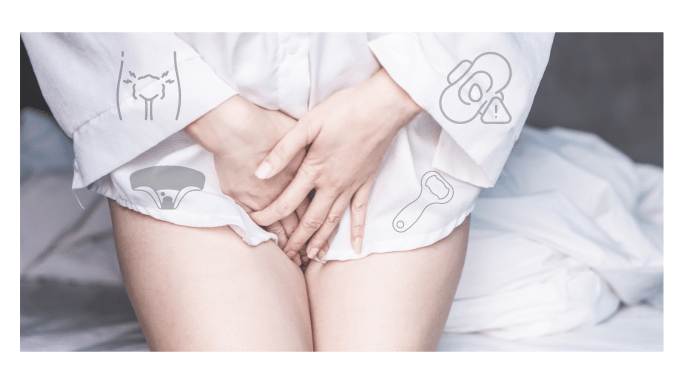Have you ever felt a bump down there and wondered, “Is that acne?” we find it embarrassing or awkward to discuss. Vaginal acne is one such topic—often shrouded in silence and shyness. Vaginal acne might sound unusual, but it's more common than you think. Let's dive into what it is, why it happens, and how to manage it effectively, all while keeping it simple and interesting!
What Exactly is Vaginal Acne?
Imagine discovering a bump or pimple in your vaginal area. That’s vaginal acne—a condition where pimples appear around the vulva and other intimate regions. These bumps can resemble those found on your face or body, ranging from small whiteheads to larger cysts. It’s a sensitive issue, but it's important to address it with the same seriousness as any other skin condition.
Is Vaginal Acne Common?
Yes, it’s surprisingly common! Many people encounter vaginal acne, yet it often remains unspoken due to embarrassment. Hormonal fluctuations, tight clothing, poor hygiene, and hair removal practices are frequent triggers. Recognizing that vaginal acne is a normal concern can help remove the stigma and encourage better self-care.
How Does Vaginal Acne Form?
Here’s how:
- Hormonal Changes: Fluctuations during menstruation, pregnancy, or menopause can increase oil production, leading to clogged pores and pimples.
- Tight Clothing: Wearing tight, non-breathable fabrics traps sweat and bacteria, which can clog pores and cause acne.
- Inadequate Hygiene: Not cleaning the area properly allows sweat, oil, and bacteria to accumulate, potentially leading to acne.
- Hair Removal Practices: Shaving, waxing, or using depilatory creams can irritate the skin and cause ingrown hairs, which can develop into acne.
- Stress: High-stress levels can disrupt your hormonal balance, making you more prone to breakouts.
Is Vaginal Acne Dangerous?
For most people, vaginal acne isn’t dangerous, though it can be uncomfortable and distressing. Understanding that it’s usually not a serious health issue can help you approach it with the right mindset. However, if you're unsure or if symptoms persist, it’s wise to consult a healthcare provider to rule out other conditions.
How Can You Cure, Reduce, or Control Vaginal Acne?
Ready to tackle those bumps? Here’s your plan:
- Maintain Good Hygiene: Wash the area daily with mild, fragrance-free soap and warm water. Avoid harsh scrubbing to prevent irritation. Regularly change tampons or pads during menstruation to maintain hygiene. Consider using menstrual cups as a convenient and hygienic alternative.
- Choose Breathable Fabrics: Opt for loose, breathable cotton underwear and clothing to reduce friction and allow the skin to breathe.
- Apply Warm Compresses: A warm compress can help reduce inflammation and promote healing. Apply it to the affected area for a few minutes to address itching and pain.
- Avoid Irritants: Stay away from scented products, harsh soaps, and rough fabrics that can aggravate the skin.
- Be Careful with Hair Removal: Consider trimming or using sensitive-skin hair removal products. If shaving, use a clean razor and shave in the direction of hair growth.
- Manage Stress: Stress can exacerbate acne. Engage in relaxing activities such as yoga, meditation, or simple leisure activities to help keep stress levels in check.
When Should You See a Doctor?
- While many cases of vaginal acne can be managed with home remedies, consult a healthcare professional: If,
- you notice persistent, painful, or unusual bumps,
- when acne persists or worsens despite treatment
- When you experience severe pain, swelling, or signs of infection, such as pus or fever.
A healthcare provider can provide a proper diagnosis and recommend targeted treatments.
Why It’s Important to Address Vaginal Acne
In a world where we are constantly busy and often shy about discussing personal health issues, understanding vaginal acne is vital. It's not just about addressing discomfort—it’s about embracing your body’s signals and taking control of your health without feeling embarrassed. By learning about vaginal acne and knowing how to manage it, you empower yourself to maintain your health and well-being confidently. Don’t let embarrassment hold you back from seeking the help you need. Embrace the knowledge, take action, and keep yourself feeling your best.
Conclusion
Vaginal acne might not be a topic of everyday conversation, but it’s an important health issue that deserves attention. By understanding its causes and effective treatments, you can manage it confidently. Remember, By talking about vaginal acne openly, we can break down the stigma and help everyone manage their health with confidence. So next time you hear someone mention an unusual bump "down there," you’ll know it’s just another form of acne, and there's no need to panic!

